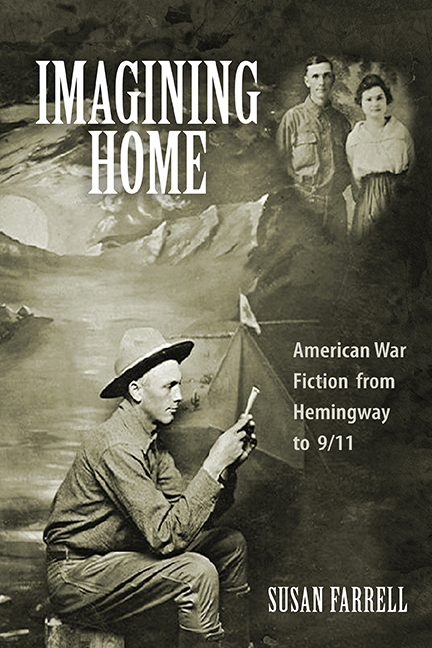Book contents
- Frontmatter
- Contents
- Acknowledgments
- Introduction
- 1 “Isn't It Pretty to Think So?”: Ernest Hemingway's Impossible Homes
- 2 A “Nation of Two”: Constructing Worlds through Narrative in the Work of Kurt Vonnegut
- 3 “It Wasn't a War Story. It Was a Love Story”: Tim O'Brien and the Ethics of Home
- 4 “A Hole in the Middle of Me”: Shattered Homes in Post-9/11 Literature
- Afterword
- Notes
- Works Cited
- Index
- Frontmatter
- Contents
- Acknowledgments
- Introduction
- 1 “Isn't It Pretty to Think So?”: Ernest Hemingway's Impossible Homes
- 2 A “Nation of Two”: Constructing Worlds through Narrative in the Work of Kurt Vonnegut
- 3 “It Wasn't a War Story. It Was a Love Story”: Tim O'Brien and the Ethics of Home
- 4 “A Hole in the Middle of Me”: Shattered Homes in Post-9/11 Literature
- Afterword
- Notes
- Works Cited
- Index
Summary
ALTHOUGH AMERICAN LITERATURE that responds to the 9/11 terrorist attacks has been described as presenting a significant break with the past—a new kind of literature for a new kind of crisis—this book argues for a continuity of concerns between 9/11 fiction and the twentiethcentury American war fiction that preceded it. Each major catastrophe underpinning the events described in the war fiction examined here was experienced as a traumatic and unprecedented break from the past, from “the war to end all wars,” the common phrasing of a moniker first used by H. G. Wells in 1914 to describe the First World War, to the genocide of Nazi extermination camps and the total destruction threatened by the atomic weaponry of the Second World War, to what has been called a loss of America's mythic self-vision in its first major international defeat during the Vietnam War, to the vulnerability associated with the terrorist attacks in the heart of the American homeland. Further, American writers have responded to the cataclysmic events in American history in similar ways. Each of these events has been theorized as a fall from innocence. While soldiers such as Frederic Henry in A Farewell to Arms could enter the First World War with heroic ideals, they could not leave war with those ideals intact. Even Hemingway himself said that he was an “awful dope” going into the war, imagining it as a sporting event, with himself playing on the “home team” and the Austrians on the “visiting team” (C. Baker 8). Vonnegut, in writing about the Second World War, asserts that scientists working on atomic weaponry have known “sin” after the war, and he depicts characters such as Billy Pilgrim in Slaughterhouse-Five who try to recapture a lost Eden, a prelapsarian world free of sin. O'Brien utilizes repeated images of men falling into holes and trapdoors and tunnels to explore the perpetrator's guilt often associated with American involvement in Vietnam, especially for young soldiers brought up on the sanitized mythology of the Second World War as “the good war.” Finally, in 9/11 literature, the complacent globalism and prosperity of 1990s America gives way to the War on Terror, in which Americans are not safe at home and America is not beloved in the world.
- Type
- Chapter
- Information
- Imagining HomeAmerican War Fiction from Hemingway to 9/11, pp. 186 - 192Publisher: Boydell & BrewerPrint publication year: 2017

